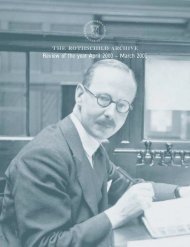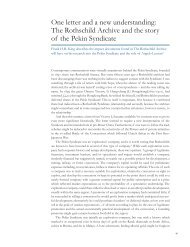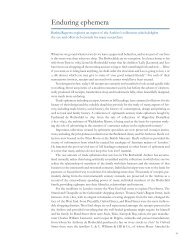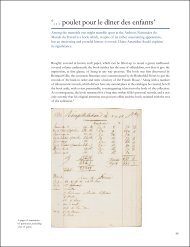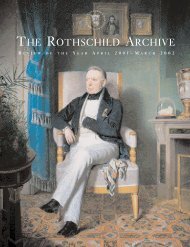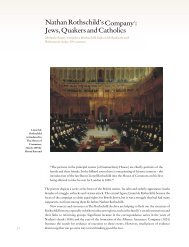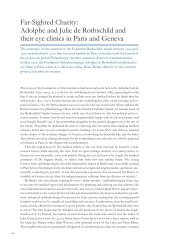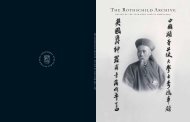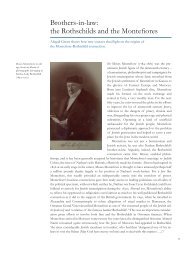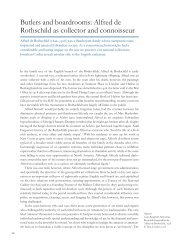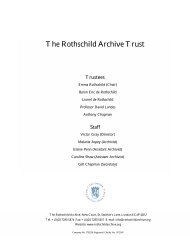66900 Rothschild Archive - The Rothschild Archive.
66900 Rothschild Archive - The Rothschild Archive.
66900 Rothschild Archive - The Rothschild Archive.
Create successful ePaper yourself
Turn your PDF publications into a flip-book with our unique Google optimized e-Paper software.
Letters written to<br />
Betty de <strong>Rothschild</strong> by<br />
Marguerite d’Orléans,<br />
Princesse Czartoryska.<br />
Like her close contemporary, Charlotte, Baroness Lionel de <strong>Rothschild</strong> (1819–1884) Betty<br />
was a <strong>Rothschild</strong> daughter as well as a <strong>Rothschild</strong> wife and mother. Charlotte’s father wrote to<br />
her at the time of her marriage about her new responsibilities, reminding her to ‘find out what<br />
is happening in London … go visiting every Sunday’. While excluded from a direct role in the<br />
business, the <strong>Rothschild</strong> women nevertheless made their own contributions to the advancement<br />
of the family. Hospitality played a key part of the development of the <strong>Rothschild</strong> business,<br />
the splendour of which was noted by Lady Granville, wife of the British Ambassador to<br />
Paris in the 1830s, in a letter to her sister. ‘On Saturday we dined at a sumptuous feat at<br />
<strong>Rothschild</strong>s’. She reported that the hostess, Betty de <strong>Rothschild</strong>, ‘just out of her nursery …<br />
does the honours of her house as if she had never done anything else’. <strong>The</strong> letters in this collection<br />
underline the significance of the role of the women of the family.<br />
In her new biographical study Laura Schor describes Betty’s advancement in society; her<br />
friendship with Queen Marie-Amélie brings her into the most exclusive and influential social<br />
circles in Paris. Betty ‘joined the charitable endeavours that constituted part of the accepted role<br />
for society ladies’ and developed a ‘public role as a philanthropist’.² Letters in the collection<br />
underline this view. Here are ten letters from the queen, all but one (from Malvern in 1858) written<br />
from Claremont, the Surrey estate where she spent her years of exile. Three of the letters<br />
seek Betty’s intervention to help secure appointments for the queen’s protégés, three men who<br />
have all provided services and friendship to the queen and her family and for whom she hopes<br />
that positions might be found in the <strong>Rothschild</strong> bank in Paris. One letter written by the queen<br />
to James de <strong>Rothschild</strong>, from Neuilly on 12 November 1829 makes a direct appeal to him to<br />
assist the career of Eugène de Sabor who was at school with her son. <strong>The</strong> remaining letters are<br />
largely expressions of thanks for good wishes and gifts for ‘les exilés de Claremont’, and the<br />
final letter, written on 21 February 1865, a year before the queen’s death, contains the good news<br />
of the impending homecoming from Brazil of François d’Orléans, her third son, and his wife,<br />
especially welcome to her after the harshness of the winter which the 85-year-old queen has<br />
found a particular trial. Betty’s gift – a bottle of Bourbon – was perhaps intended to alleviate at<br />
least some of its worst effects.<br />
50



